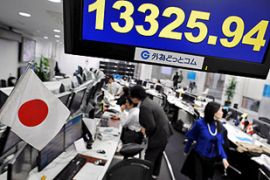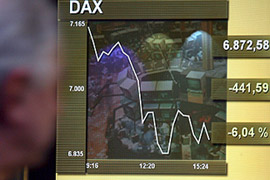Asian markets continue slide
Share prices in Tokyo, Shanghai and Hong Kong plunge on US recession fears.

India‘s main share index fell 9.5 per cent seconds after opening, triggering an automatic one-hour halt in trading, the Bombay Stock Exchange said.
The Australian share market plunged to a 15-month low in panic selling on Tuesday, with the benchmark S&P/ASX200 index falling by 5.2 per cent to 5,290.5 by around midday on Tuesday.
That was 23 per cent lower than its November 1 record of 6,851.5 and beyond the 20 per cent decline that normally defines a bear market.
In South East Asia, Singapore shares opened 3.95 per cent lower following a drop of more than 6 per cent on Monday.
Trading in Wall Street was closed on Monday for a holiday but European, Canadian and Latin American stocks also tumbled.
George Bush, the US president, has called for an economic stimulus plan worth up to $150bn in tax cuts and other measures.
Global plunge
But world share markets have plunged on fears it will not be enough to stave off a recession in the world’s largest economy.
 |
| European markets also suffered plunging stocks [EPA] |
Japanese investors are speculating that Bank of Japan will move to cut interest rates to prevent shares from being dragged down by the declining US economy.
“Everything is being sold, and everybody’s selling,” said Takashi Ushio, head of the investment strategy division at Marusan Securities, as the Nikkei average took its losses to 17 per cent so far this year.
“If Wall Street falls again today, and the US government doesn’t come up with some sort of policy response, we have to accept that there will be still more falls,” he said. “They need to do something dramatic.”
Government reaction
Hiroko Ota, Japan‘s minister for economic and fiscal policy, suggested the government would not immediately intervene.
“Stock markets across the world are falling and it basically stems from the United States,” she said.
“It is difficult at the moment to mull action by Japan alone. Instead, we should co-operate globally,” she added.
Lee Heung-mo, head of the Bank of Korea’s financial markets department, told Reuters that short-term liquidity remained abundant and that there was no sign of any abnormal money flows out of investment funds.
“There’s little [the central bank] can do now, with the markets moving mainly due to factors coming from outside of the country,” Lee said.